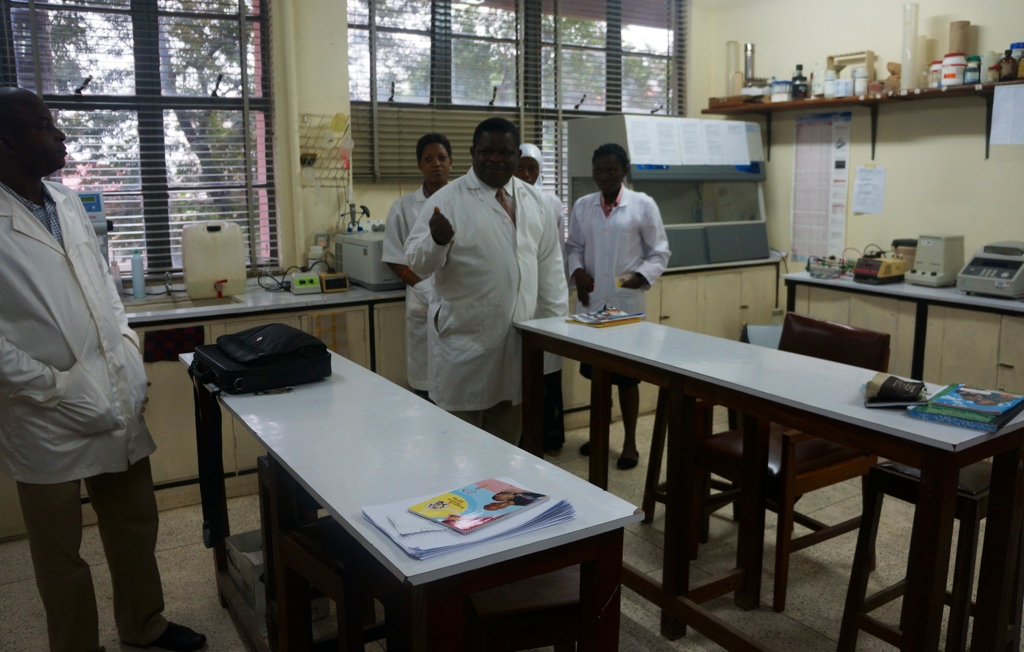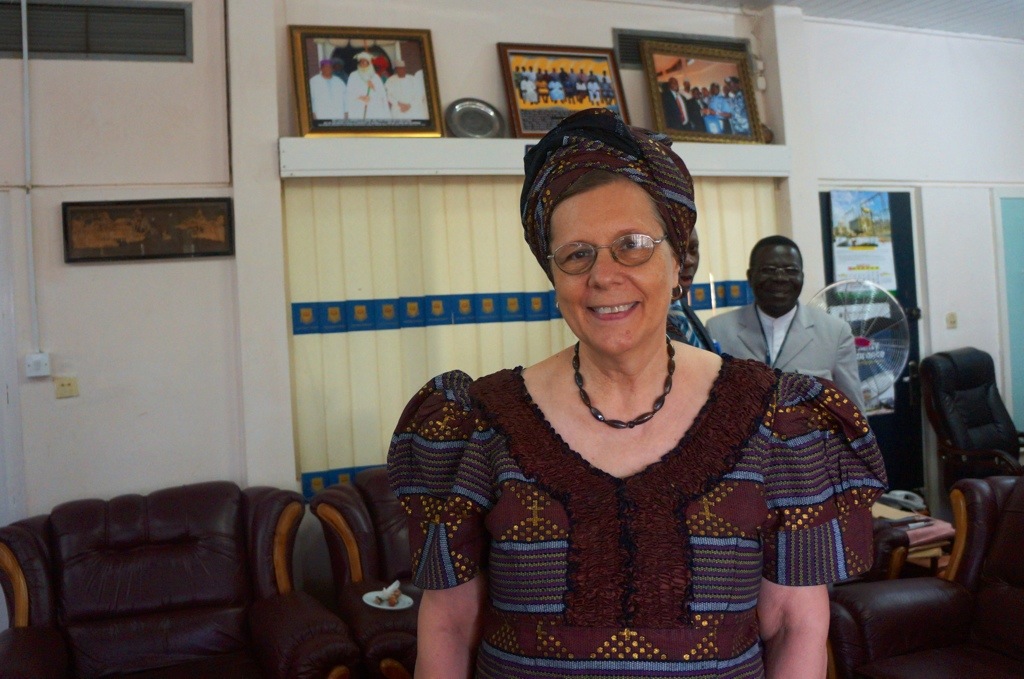August 28
Awoke early and utilized something I learned earlier in the trip. When you see a bucket in the bath tub, you can use that for showering. Cuts down on the singing a bit, but certainly conserves water. Though HLF House (Healthy Life for All) is unlikely to be a target for a Four Seasons takeover, it works well for a night, saves hotel bills and is a great facility for the Global Health Initiative (GHI).
My two problems on awakening were lack of Internet connection and wet laundry, in the scheme of global health issues, those are not all that serious. The first has already been solved, courtesy of Christine, who is in her final year of medical school at the University of Chicago and doing a second stint in Nigeria through GHI. Her work is dealing with the economic impact of catastrophic illness as it relates to the economic barriers to providing good care. This is a perfect example of the interdisciplinary approach that the Olopades take to global health. The second problem requires figuring out what to do with wet laundry en route to Ghana later today. Another cultural disconnect was my assumption that when the staff at HLF said they’d do the wash, they’d then just throw it into the drier.
This day, or really half a day was packed with meetings/tours. I won’t give you details of them all because I didn’t fully understand all of it and couldn’t possibly remember it all, if I did. We started at the teaching hospital of Ibadan University, with which GHI partners. We saw the lab where DNA was gleaned, frozen and sent to GMI for compilation and analysis. The head of the lab explained the expensive new machinery and process.
The work is designed to identify genetic differences in various populations who have breast cancer and other diseases with a view to developing appropriate medication and interventions specific to those populations. Multiple disciplines are brought to bear on the process, including microbiology and pharmacology, and we are introduced to all of the people in the lab doing the work.
From there, we went into a larger room, where again we discussed the work being done by Ibadan and GHI. Among the more interesting discussion was that by an OB/GYN doctor, Dosu Ojengbede, who had been doing work in combatting high maternal death rates due to hemorrhaging because of the inability to stem the bleeding before help could be provided. This was a particular problem in remote rural areas, and acute in the northern, Muslim areas. Dosu hit on the brilliant strategy of educating the imams and, through them, reaching people who needed the help.
Dosu had a polyurethane wet suit designed and contracted with a Hong Kong company to manufacture them. They cost less than $200, but, because they can be reused, the cost per use was about $5. The suits, of which he brought an example, look like scuba diving wet suits, with modifications designed to push the blood of the birthing mother up into her body, rather than letting it drip out. Another very simple clear bag allows people to collect blood and through colored markings on the bag, so that people don’t need to be able to read or figure out numbers, shows when certain danger levels are reached. Dosu discussed other interventions being made, which I won’t go into. All of this is very exciting.
After this meeting, we returned briefly to the house to collect our luggage and, in my case, pack some still slightly damp, but now ironed, clothes. From there we rushed off in our van to the office of the Vice Chancellor, who had thrown last night’s party, arriving some twenty minutes late. The Vice Chancellor had assembled a team of about 8-10 deans and professors who focused on agricultural matters. A simple lunch was served while we talked. Included in the group was an American professor, who had married a Nigerian doctor and moved here forty years ago. She took a sociological approach to agriculture and had outspoken feminist views that she was not bashful about sharing and confronting the men around the room with.
These various meetings give us an appreciation for the strong relationship the Olopades have established with many people at Ibadan, the fascinating, interdisciplinary nature of their work and the esteem in which they are held by everyone there. It’s a unique opportunity to witness global health in action.
We discussed many aspects of the work the Ibadan professors are doing in farming, both crops and catfish. The Kipharts are very interested in agricultural issues, and knowledgable about them. I was able to raise a couple questions about catfish farming, because I’d represented an insurance company/client in their investment in a catfish farm in Florida some thirty-five (or more) years ago.
We rushed over for a quick tour of the catfish farm, and, afterwards, were presented with a bag of gifts by the Vice Chancellor as we entered the van to the airport. We sped off, led by a truck with siren blaring (we still have the truck, but, alas, have lost the armed guards. At one point, we had a team of nine looking after us, but were down to only six now.). We had a harrowing ride, weaving in and out of traffic and avoiding potholes, as we tailgated our escort. It felt a bit like being in a video game in which the object was to reach an airport, driving as fast as possible, while staying as close as possible to the vehicle in front of you and avoiding car and pothole obstacles popping up suddenly in your way. If you make it safely to the airport, you get to play again some other day.
We get to play again. Lagos airport is crowded and we endure the usual delays and indignities, but make it on time for our short, 45-minute flight to Accra. I’m the first of our group to make it through customs and collect luggage, so I go out to the lobby to see Joe Kwarteng and his son, Daniel. Warm greetings from both, including a big hug from Joe. We chat while waiting some time for the others to make it through. More warm greetings between the Kwartengs and the Kipharts and Olopades. These are nice moments, evincing a strong friendship and family feeling that exists between all of us.
Interesting extraneous fact: Sola used to play cricket on the Nigerian national cricket team.
A van from the Golden Tulip takes us new arrivals the less than ten minutes to our modern hotel, while Joe and Daniel, who drove in to greet us from Cape Coast meet us there in their car. A ridiculously long and confused check-in process resolves itself and we go to our rooms. Twenty-five minutes later, we meet the Kwartengs in the lobby and go down for quite a good buffet dinner. The Olopades are meeting people from the pharmaceutical company, Navaris. They introduce us to the Navaris people, but we eat separately.
The Kipharts, Kwartengs and I spend most of our dinner discussing the pineapple farm in which Joe is a partner of Dick’s, and which, Daniel, a business school graduate, is running with great enthusiasm. We also discuss the problem of how to get young people interested in the less-than-glamorous field of farming. After the Kwartengs leave to drive back to Cape Coast, the Kipharts and I discuss how amazing the Olopades are, and how privileged we all are to be able to take this kind of trip together.
Up to the room to shower and collapse.




More great stuff!
Way to use the bucket.
Glad you get to play again.
L,
W.